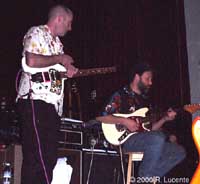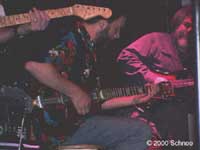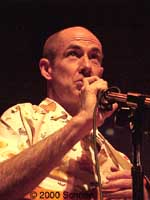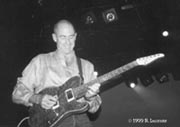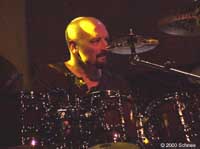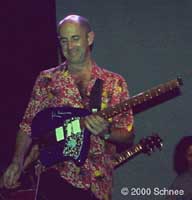|
PZ: You mentioned that you were working on an instructional video with Steve?
PZ: Will you do it in Ďlaymanís termsí? HK: Well, you know, in guitar lay persons terms. We want to make people understand how to think about pure sound and the concept of tone is in the widest sense. Tone color is a really beautiful part of music and people donít talk about it enough or think about it enough. You know the great guitar players Ė whether itís Steve, or Cippolina, or Billy Gibbons, or Carlos Santana, or Garcia Ė you can recognize them with one note from their tone and thatís a magic part of a personís sound. Each person has the potential to develop their own personal expression where they can be recognized that way and I donít think many people realize how easy it is to find the path to do that. We want to make it easier for people to express themselves uniquely as themselves Ė you know, say whatever they have to say. PZ: You mentioned Bralove before briefly. Have you been collaborating on anything else with him recently? HK: Well I played on one of his Dose Hermanos [HK also appears on this live album] albums just recently and heís making a new one and I guess Iíll put something on that. Weíre always trying to think of something new to do. Heís got a private concert coming up in April and Iíll go and play with him at that. Weíre good friends and we love working together. Heís been doing sound with us on Yo Miles!. We are happy to have him as a part of that new family. Itís great to have the big team with people we trust in things. PZ: Do you two work together, I noticed a lot of your material is on the Shanachie label? HK: I had a bunch of records since the success of David Lindleyís and my A World Out of Time on Shanachie. Iíve been able to con them into a number of other projects like Yo Miles! and I got them to put out Bob Braloveís Second Sight CD. [Sample some Second Sight here]. PZ: So, how often do you pick up a guitar? HK: Rarely. To be selfĖmanaged, Iíll pick it up while Iím on the phone or while Iím walking around the house, but unless Iím recording in the studio or playing with people on stage itís not often Iíll play guitar. I donít have the temperament to practice. (hear the following in RealAudio) I
wish I had the temperament that
my friend Steve Kimock has to practice eight or ten hour a day,
which he does do. PZ: Do you use MIDI much anymore? HK: I havenít done that much stuff with MIDI. Prior to ten years ago, I use to do a lot of TV film scoring; I had a synclaver and I would use the keyboard and that to do that kind of stuff. I made a couple of records where I would use the guitar to trigger the synclaver in the studio Ė like a record called Popular Science with Sergio Kuriokhin where we use the synclaver in the studio Ė and my solo CD, Devil in the Drain, but live I really only ever used it with a little piano module or once with an organ module and I never used it that much. (hear the following in RealAudio) Iím kind of interested in taking the analog sound from the guitar and processing it through digital processors to get strange sounds and things rather than triggering samples. MIDI is more about sequences of notes, one note following another in time, and Iím more interested in big shapes and space that turn inside out and break into different colors and explode. Thatís not really Western musical language so it doesnít really work so well for me. I could twist it to work for that but itís easier for me to do it the other way. You know, thatís what Iíve tried to add to psychedelic guitar myself Ė to add more of this kind of weird alien language from outer space, ideas from contemporary music, ideas from other world music cultures like Korean or Indian music that had psychedelic guitar Ė but I tried to drag the Korean music and Burmese music and all these other sounds that people arenít really familiar with into it as my way of pushing the boundaries.
PZ: It was great to see you sit in with Phil for the SEVA Benefit (archived RealVideo of the 11/30/99 here). (hear the following in RealAudio) HK:
Thatís kind of interesting because rather than being one of "Philís
Friends," Iím technically a "Philís PZ: How about the David Nelson Band guys? You played with them too. How was that? HK: That was really fun, I got to meet the Nelson guys and play with them at SEVA too, and they were great. Barry Sless is a great guitar player and David Nelson is a fantastically subtle player and a fantastic rhythm player Ė the way he leads the band with his playing and improvisation Ė heís great. Heís a good songwriter too. Iíd heard his CDís and thought, "Oh, thatís nice." But then when Iíd learned the songs and listened to them I said, "Wow! These are really good songs. This guyís doing really interesting and creative work." That was a really nice experience through the SEVA Benefit. Incidentally Iíve heard that the Nelson Band wants to put out a live CD as a SEVA benefit with the whole show with Phil and their own set from that night. So that may be documented as an accessible release. I wish we'd had time to rehearse with all of us Ė but there is still some good music from that show. PZ: Thatíll be great! The fans would love it. So, there wasnít any significant rehearsal before the show? HK: I got together one evening with the guys in the David Nelson Band. There was no rehearsal with Phil Ė that was just cold on stage. PZ: You also sat in with the David Nelson Band again for Bill Grahamís Menorah Lighting? HK: I did sit in with them and Merl Saunders was there too. Yeah, that was the same week and that was fun too. I played at the Menorah Lighting once before and I enjoyed that before too. PZ: What was that all about? HK: Thereís this one particular rabbi who likes that sort of music who organizes this big event of lighting the menorah there with music all afternoon and evening and it seems to be a really good event. Donít know much else about it. PZ: Youíve been really popular in Japan. It seems like they really like your playing. Thereís a lot of Deadheads there but it seems that they really like you in particular. HK: Well Iíve been playing a lot in Japan since 1978 Ė before there were Deadheads in Japan or anything like that. So itís just a place Iím comfortable going to. I speak a little Japanese, so I know how to get along and I have connections over the years so I do like going there a lot. I was just there with my friend Mike Keneally and we had a real nice show there. PZ: What is it like to play to a crowd over there? HK: Itís fine. Itís just like anywhere really Ė yeah, theyíre great. Iíve been really blessed that I usually end up in front of really enthusiastic audiences and that makes it pretty easy to play anywhere. You know, like the other night at the Fillmore, the audience did half the work for us. PZ: At the Fillmore, did you feel something similar to what would happen at Grateful Dead scenes Ė you know the energy from the crowd "playiní the band"?
I could see how it was tough for Garcia in the last years Ė you know, "Jerry youíre God. Youíre the best" and to get up there when youíre having health problems and life problems and you might not play very well on a particular night and everybodyís still telling you that youíre God Ė itís not a healthy relationship with the audience. Thatís a challenge to guys in the Grateful Dead who continue to work with the scene to establish healthy things with the audience which I think Philís been doing with the Phil & Friends things. Heís not concentrating the energy unduly on himself Ė and he's varying the context to get the audience to really focus on the music and interactions. PZ: It seems like heís definitely trying to spread it out. Heís anxious to get other peopleís takes on the music rather than recreate the Deadís sound and arrangements. HK: You know I donít think there was something the Grateful Dead tried to do before Ė itís just the way it evolved. Through the glorious, beautiful and sometimes ugly and complex way the Grateful Dead is a giant organism including everybody who worked for it behaved. (hear the following in RealAudio) Itís been a really interesting phenomenon to watch from the outside. Iíve been lucky to get the close-up view of a few things. I was lucky and it was tough (here Iím being emotional) Ė it was tough to sit onstage next to Bralove on the side of the stage and look at Garcia on those gigs where heíd face the amp most of the time and see the expression on his face that you guys wouldnít see from the house, when he was having a hard time. That was a tough thing and I tried to learn something from that and it was hard to see your hero like that. Iíd often get more intimate views than a lot of fans would get and that was a good thing to have, but a tough thing to have too. PZ: That probably changes your perception of the music scene in a way.... HK: As I was saying, itís such a complex thing. Itís hard to know. When you love someone as much as I loved Jerry, it could be tough... Everybody out there knows what it's like to love the guy because of his music and because of what you saw of his personality, but to seem him down and unhappy, that was a tough thing to watch, wasn't it? PZ: Yes. Many focused much attention on him, but to know who the man really was Ė it kind of changes the myth... HK: Yeah, and people can be wise or unwise with what they do with that attention. Itís a responsibility to the audience what they do with that attention too. You know, Iíd sure never want to be in the spotlight that much, no thanks. No thanks! PZ: Yeah, thatís a real tough position to be in and it can rob you of your personal life. So what do you like to do in your spare time?
PZ: Thatís a great approach! Keep surprising us and thanks for your time. It was a pleasure.
Henry
recommends specific CDs here See
the setlist and more photos from the 11/30/99 SEVA Benefit show
here
(thanks
to Stan Russell and DNB). Special
thanks to Henry Kaiser
Yo
HK! An Interview with Henry Kaiser: Experimental Guitarist This
interview or any photos included may not be reprinted anywhere
in |
![]()
